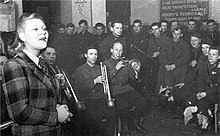Klavdiya Ivanovna Shulzhenko (Russian: Кла́вдия Ива́новна Шульже́нко, Ukrainian: Клавдія Іванівна Шульженко; March 24 [O.S. March 11] 1906 – June 17, 1984) was a Soviet popular female singer and actress.

Biography
editShulzhenko started singing with jazz and pop bands in the late 1920s. She rose to fame in the late 1930s with her version of Sebastián Iradier's La Paloma. In 1939, she was awarded at the first all-Soviet competition of pop singers.[1]
| A selection of Shulzhenko's cinema and TV appearances. The songs include "The Blue Headscarf" and "Let's Have a Smoke". With commentary by actor Igor Gorbachyov. |
During World War II, Shulzhenko performed about a thousand concerts for Soviet soldiers in besieged Leningrad and elsewhere. The lyrics of one of her prewar songs, "The Blue Headscarf", were adapted so as to suit wartime realities. Another iconic song of the Eastern Front (World War II), "Let's Have a Smoke", was later used by Vladimir Menshov in his Oscar-winning movie Moscow Does Not Believe in Tears.
In 1945, Shulzhenko was awarded the Order of the Red Star. She, as traditional pop singer, was named People's Artist of the USSR in 1971.[2]
On April 10, 1976, Shulzhenko performed to enraptured audience in the House of the Unions in what would become her most famous concert.
Tribute
editOn 24 March 2016, Google celebrated Klavdiya Shulzhenko’s 110th birthday with a doodle.[3]
References
edit- ^ "Народная артистка Клавдия Шульженко". Archived from the original on 2017-01-17. Retrieved 2013-04-10.
- ^ "Клавдия Шульженко. Одиночество в розовом цвете". Argumenty i Fakty. Archived from the original on 2007-11-21. Retrieved 2011-03-27.
- ^ Desk, OV Digital (2023-03-23). "24 March: Remembering Klavdiya Shulzhenko on Birthday". Observer Voice. Retrieved 2023-03-23.
{{cite web}}:|last=has generic name (help)